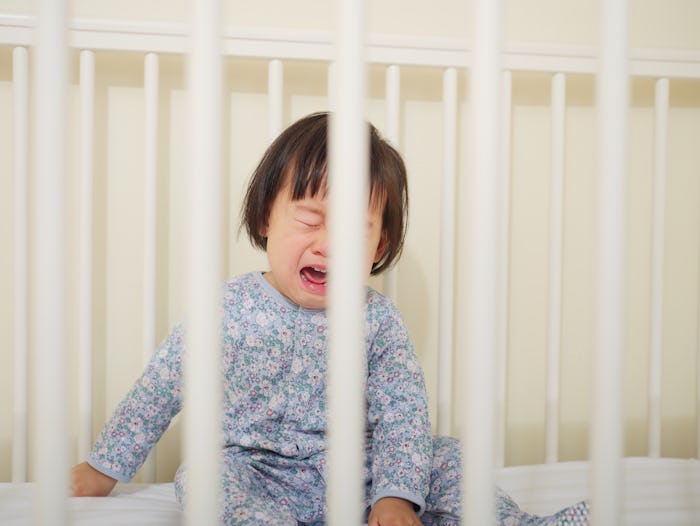Life

Here's Why Your Toddler Is Totally Freaked Out By Their Crib
One of the most common behavioral issues parents may encounter with young children happens during bedtime. It’s especially vexing when a child seems to “revert” from being able to sleep alone to crying out for comfort. So what should you do if your child is afraid of their crib?
How you approach your child’s fear of being in the crib depends on their age and how it arises. As you of course know, young children require attention at bedtime to remain fed and dry, while older children can start to learn to sleep on their own. “Typically, most parents would want to begin thinking about doing some sleep training when the child is 4-6 months old and no longer needs to eat at night for ‘physiological’ reasons but more because of a ‘feeding to sleep’ habit,” Dr. Lynelle Schneeberg, clinical psychologist and assistant professor at the Yale School of Medicine, tells Romper. This distinction is important: Older children can start to develop an emotional attachment to your presence, as opposed to younger children who need you to tend to their physical needs. Younger children aren’t necessarily in distress, but are alerting you to their hunger or other issues.
Older children, however, may engage in comfort-seeking behavior due to habit or environmental factors. “Most ‘fear of the crib’ issues pop up around toddler hood (after 18 months or so),” Dr. Schneeberg says. She explains that one way this happens is habit: “In a nutshell, what happens is that kids develop certain ‘sleep onset associations’ (these are also often called ‘sleep crutches’) and this means that if you hold your baby and rock or sing him or her to sleep and put them into the crib when it seems they are already asleep, they may wake back up and seem afraid because they are used to the parent doing the job for them and know that they will have a hard time falling asleep independently. They may also protest because they are so used to a parent’s assistance and don’t want to learn a ‘new’ way to fall asleep.” This shift might not be easy at first, but it will happen.
"As soon as your baby understands that the crib is a safe place to be – she learns this by positive, consistent, and constructive affirmations and reinforcement from you – then she will stop being nervous or ‘afraid’ of her sleep environment," Brooke Nalle MS Ed., a "Gentle Sleep Coach," wrote for the Sleep Lady website. "She will look forward to this safe place and wake up happy ready to share her day with you."
Another way crib fear occurs is a change in routine, which may be the culprit if your toddler suddenly expresses newfound distress at being left in the crib. These differences in cause may affect how you should address your child’s crib anxiety: Dr. Schneeberg says, "If the child is just being transitioned into a crib the first time you would want to handle crib fear one way, but if the child has been sleeping happily in a crib but is showing fear only after you return home from a vacation where a parent has been in the same room, you’d want to handle the crib fear differently. In other words, in the latter example, the child may have become used to more ‘parental assistance’ when falling asleep due to the vacation sleep environment.” When your child becomes re-accustomed to the “extra” comfort of your presence, they may cry out in distress when you go back to the normal routine, and they realize they can try and “demand” more special comforting.
In this case, there are ways to comfort your child, while training them to fall asleep on their own. “There are many ways to sleep train. Sleep training does not mean that you are ignoring your child. Some parents sit very nearby to provide comfort but do not pick the child up or take the child out of the crib,” Dr. Schneeberg says.
“You have to put a child in the crib dry and fed but fully awake, and then you have to let them work out how to get from fully awake to fully asleep independently. You can be nearby when your child is learning this, of course.”
Remember, though it may tug at your heart strings, gently teaching your child to fall asleep on their own doesn’t have to be scary. “It can be difficult not to pick your child up while he or she is learning to self-soothe and fall asleep independently but you need to trust that it is good for your child (and for you, as a parent) to teach your child to fall asleep more independently so that everyone gets a good night’s sleep. It is similar to teaching a child to ride a bike. You wouldn’t run alongside your child’s bike forever; you’d teach them to ride with training wheels and then completely independently,” Dr. Schneeberg says.
Just remember, no matter how frustrating the process can be, at some point your little one will get over their fear of the big, bad crib... and bedtime will be back to normal (or whatever passes for normal once you have kids).
This article was originally published on